|
|
|
Sort Order |
|
|
|
Items / Page
|
|
|
|
|
|
|
| Srl | Item |
| 1 |
ID:
138320
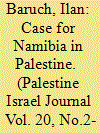

|
|
|
|
|
| Summary/Abstract |
In March 2006 I was received by President Hifikepunye Pohamba of Namibia, as the ambassador designate of Israel to that country, in his official residence in the capital city Windhoek. The tall and elegant man with a captivating beaming smile warmly received my letter of accreditation. According to protocol we sat for a short conversation. This was the opportunity for him to set the rules for our future relations.
|
|
|
|
|
|
|
|
|
|
|
|
|
|
|
|
| 2 |
ID:
062952


|
|
|
| 3 |
ID:
139345
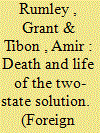

|
|
|
|
|
| Summary/Abstract |
On March 17, Israeli Prime Minister Benjamin Netanyahu won reelection, thanks in part to a desperate last-minute pledge to his right-wing base that the Palestinians would never get a state so long as he was in power. After the election, he tried to walk his comments back, but Palestinian observers weren’t buying it. As one person close to the Palestinian leader Mahmoud Abbas put it, Netanyahu’s reelection marked the end of an era, “the final closing of the window of opportunity for a negotiated solution.” The insider continued: “Two years ago, [U.S. Secretary of State] John Kerry told the U.S. Congress that in a matter of a year and a half, or two years at most, the window will close. He was right. It’s over.”
|
|
|
|
|
|
|
|
|
|
|
|
|
|
|
|
| 4 |
ID:
052739


|
|
|
| 5 |
ID:
026350


|
|
|
|
|
| Publication |
London, WeidenFeld and Nicolson, 1972.
|
| Description |
179p.
|
| Standard Number |
0297995767
|
|
|
|
|
|
|
|
|
|
|
|
Copies: C:1/I:0,R:0,Q:0
Circulation
| Accession# | Call# | Current Location | Status | Policy | Location |
| 010899 | 322.42095694/PRY 010899 | Main | On Shelf | General | |
|
|
|
|
| 6 |
ID:
169418


|
|
|
|
|
| Summary/Abstract |
This essay questions a key takeaway from the Ferguson/Gaza convergence that catalyzed the current wave of Black-Palestinian transnational solidarity: the idea that “equivalence,” or a politics of analogy based on racial or national identity, or racialized or colonial experience, is the sole or primary grounds for solidarity. By revisiting three recent spectacular moments involving Black intellectuals advocating for Palestine—Michelle Alexander's op-ed in the New York Times criticizing Israeli policies, CNN's firing of Marc Lamont Hill, and the Birmingham Civil Rights Institute's initial decision to deny Angela Davis its highest honor—this paper suggests that their controversial positions must be traced back to the post-1967 moment. The convergence of Black urban rebellions and the June 1967 Arab-Israeli war birthed the first significant wave of Black-Palestinian solidarity; at the same time, solidarities rooted in anti-imperialism and Left internationalism rivaled the “Black-Jewish alliance,” founded on analogy of oppression rather than shared principles of liberation. Third World insurgencies and anti-imperialist movements, not just events in the United States and Palestine, created the conditions for radically reordering political alliances: rather than adopting a politics of analogy or identity, the Black and Palestinian Left embraced a vision of “worldmaking” that was a catalyst for imagining revolution as opposed to plotting coalition.
|
|
|
|
|
|
|
|
|
|
|
|
|
|
|
|
| 7 |
ID:
160527


|
|
|
|
|
| Summary/Abstract |
This article explores the ideological rigidity of secular and religious terror groups. Analyzing leaflets disseminated by two Palestinian groups during the First Intifada, it examines if and how each shifted its identity and goals in response to repression, political shifts, or resource changes. The results suggest that while similar catalysts led to ideological reformation among the secular and the religious group, the extent of ideological change within the religious group was more limited. The article argues for the need to disaggregate ideological analysis further in order to identify more subtle shifts, alterations, and omissions, in the positions held by religious terror groups, moving past the exploration of if such changes exist in ideological templates and instead focusing on the extent and type of alterations the different groups allow.
|
|
|
|
|
|
|
|
|
|
|
|
|
|
|
|
| 8 |
ID:
180888


|
|
|
|
|
| Summary/Abstract |
From the perspective of a practitioner who was deeply engaged in the negotiations, this article describes how the Israeli-Palestinian Mutual Recognition Agreement was conceived and negotiated. It explains the process of convincing Israeli and Palestinian leaders to accept mutual recognition, overcoming their initial objections. While not nearly as publicized as the 1993 Declaration of Principles agreed at Oslo, this Agreement became the bedrock for all the Oslo Accords, and set the stage for subsequent negotiations.
|
|
|
|
|
|
|
|
|
|
|
|
|
|
|
|
| 9 |
ID:
091996
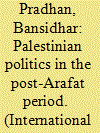

|
|
|
|
|
| Publication |
2008.
|
| Summary/Abstract |
The article examines the key development in Palestinian politics in the post-Arafat era, including the decision of Hamas to participate in the democractic political process. Even though the issue of succession was settled with much more ease then expected, the divisions within the Palestinian movement came to the fore with the electoral victory of Hamas in the January 2006 legislative elections.The subsequent power struggle between fatah and Hamas completely fragmented the palestinian community.
|
|
|
|
|
|
|
|
|
|
|
|
|
|
|
|
| 10 |
ID:
128072
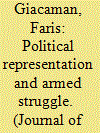

|
|
|
|
|
| Publication |
2014.
|
| Summary/Abstract |
In 1974, both the Arab League and the United Nations recognized the Palestine
Liberation Organization (PLO) as the "sole, legitimate representative of the
Palestinian people." This article explores the dynamic history of the PLO's
methods of political representation from its establishment in 1964 through the
height of the armed struggle in the mid-seventies. Contrasting fedayee theories
of political representation with their practice, the author draws upon a range
of ideological documents produced by different guerrilla factions, as well as
accounts from prominent actors in the movement.
|
|
|
|
|
|
|
|
|
|
|
|
|
|
|
|
| 11 |
ID:
063279


|
|
|
| 12 |
ID:
021933


|
|
|
|
|
| Publication |
Oct-Dec 2001.
|
| Description |
381-426
|
|
|
|
|
|
|
|
|
|
|
|
|
|
|
|
| 13 |
ID:
104251
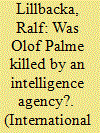

|
|
|
| 14 |
ID:
145061


|
|
|
|
|
| Summary/Abstract |
In 1970, the Palestine Liberation Organization (PLO) Research Center in Beirut published an Arabic translation of The Zionist Idea, an anthology of classic Zionist texts compiled originally by Arthur Hertzberg in 1959. This article compares how the two versions present the biographies and motivations of key Zionist ideologues. It suggests that, in contrast to Hertzberg, the PLO researchers tended to present Zionism, especially at its roots, as a Jewish religious movement. Attempting to discern what might lie behind this conception of Zionism, the article considers the significance of the religious backgrounds of the leadership of the PLO Research Center and of those involved in the translation project. It argues that the researchers’ concern about the status of Christians as a religious minority among Palestinians and other Arabs and certain deeply rooted Christian ideas about the nature of Judaism may help account for the particular view of Zionism that the Research Center developed in its—and in the PLO's—foundational years.
|
|
|
|
|
|
|
|
|
|
|
|
|
|
|
|
| 15 |
ID:
138322


|
|
|
|
|
| Summary/Abstract |
The current Palestinian state of affairs resembles a critical case of schizophrenia. On the outside, the Palestinian leadership is actively positioning the Palestinian cause internationally. They’ve acquired membership in international organizations and are pursuing a tenacious endeavor to secure the international community’s official recognition of the State of Palestine. Internally, however, Palestinians are divided politically, disconnected from one another geographically, have little control over their land and resources and, most importantly, continue to operate under the auspices of the Oslo Accords, which make them highly dependent on Israeli inclinations.
|
|
|
|
|
|
|
|
|
|
|
|
|
|
|
|
|
|
|
|
|